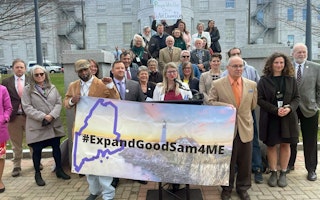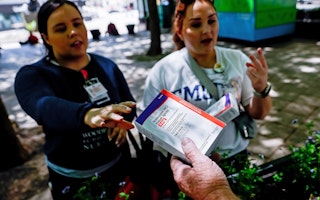Drug Trafficking and the Role of Civil Society in West Africa
By Afia Asare-Kyei
The rise of massive, powerful, and wealthy organized crime syndicates now illicitly trafficking narcotics across West Africa has thrown yet another threat into the already toxic brew plaguing the region. It's a challenge that requires a coordinated and multipronged solution. It also requires the active involvement of civil society actors across the region.
Last week, Ghana’s vice president Kwesi Amissah-Arthur inaugurated the West Africa Commission on Drugs. Convened by Kofi Annan and chaired by the former Nigerian president Olusegun Obasanjo, the Commission plans to examine ways to crack down on drug trafficking and grapple with its impact on West Africa. The establishment of the Commission is welcomed and its inauguration timely.
Trans-shipment of illicit narcotics from Latin America through to West Africa and onwards to Europe has increased significantly. Since 2008, the volume of cocaine transiting through West Africa was roughly 50 tons a year, and its annual worth is estimated at $2 billion. Nearly 50% of all non-U.S.-bound cocaine, or about 13% of all global flows, is now smuggled through West Africa. Just six hours away from Europe, and about 1,600 miles across the Atlantic from Latin America, West Africa’s geographical proximity to European markets makes it strategically located for drug-smuggling purposes.
Local production and consumption are also on the rise, especially among the burgeoning youth population. Over 70% of the subregion’s estimated 300 million people are under the age of 35. The vast majority have limited education and are unemployed or working in the informal sector. Lack of employment opportunities or reliable income put youth in precarious positions where they may be vulnerable to involvement in the drug trade and drug use. In desperate and troubling circumstances, drugs offer a means of escaping the harsh realities of everyday life.
Apart from the damaging effects of drug use on West Africa’s human resource base, related offenses such as corruption and money laundering have also had a severe impact on the socio-economic development and governance of the region. Drug-related corruption and money laundering accentuate the chronic poverty in many West African states by disrupting effective economic governance.
In a number of countries, the profits from trafficked drugs exceed the gross national income. Rampant drug trafficking empowers criminal elements operating outside the law, undermines governance, weakens state institutions, perverts the criminal justice system, and hijacks prosecutors, police officers, and judges. Drug traffickers do not simply undermine governments, they also use illicit money to acquire and in some cases seize political and economic power and then wield such power in the most outrageous and scandalous manner.
A lot of time and resources have been invested in trying to combat this scourge. At the regional level, the African Union has just developed its fourth revised plan of action. This new 2013-2017 policy on drug control seeks to strengthen continental and international cooperation and further integrate drug control issues into national legal and institutional frameworks. On a subregional level, the Economic Community of West African States issued a declaration entitled “Community Flame Ceremony: The Fight Against Drugs.” This was over 15 years ago. That same year, they set up a regional fund for financing drug control activities in West Africa. Ten years later, in 2008, ECOWAS adopted the Praia Plan of Action and the Abuja Declaration to address the security threats posed by drug trafficking in the sub-region.
All of these initiatives have had very limited success. At the national level, almost all ECOWAS states have adopted National Integrated Programmes. Many states have amended their drug trafficking and consumption legislations, empowered their judicial authorities, established new drug enforcement agencies and imposed stiffer penalties for offenders. These have fared no better than the regional efforts.
The obvious question still remains: why have these plans and policies continued to fall short? Many factors may help explain. Poor implementation, lack of funding, and singularly focusing on toughening punitive measures are all reasons to consider. Most policies have singularly focused on one dimension instead of employing a multipronged approach. Apart from the absence of political will and a clear vision from West Africa’s leaders, there has been an absence or altogether inability to mobilize a critical mass of the population to actively participate in the full stretch of the process—from inception to implementation, through to monitoring and review.
The dual failure to build alliances with civil society and nongovernmental and community-based organizations, as well as the failure to educate the populace have been major missing elements in the fight against narcotics trafficking and use. Most governments continue to treat the drug problem as the exclusive domain of the state. Mere lip service is paid to engaging civil society. Civil society, including NGOs and community-based organizations, has an important role in raising awareness and educating citizens. Only token efforts have been made to provide information about the health, socio-economic, and security problems associated with drug trafficking and consumption. In many countries, citizens unaware of the harmful impact of drugs continue to idolize the drugs lords and dream of amassing their vast wealth, cruising around in flashy Hummers as so many drug barons do.
Most civil society groups currently lack the necessary expertise to make a meaningful contribution to this fight. There is an ardent need to strengthen the capacity of civil society to monitor and report on drug trafficking and other related crimes and to help implement the various regional and national action plans. Civil society groups can engage the public—including influential religious and traditional leaders—and help facilitate public debate. Both steps can make a huge difference in educating people about the impact of drugs. In most instances, policies have been driven by external considerations. Civil society can help reverse this trend and ensure that local perspectives are heard and that initiatives are locally owned.
The new West Africa Commission on Drugs has set as one of its key objectives to mobilize public opinion and catalyze political support for further action at national, regional, and international levels before drug-fuelled problems become totally unmanageable. In other parts of the world, civil society–led efforts have helped overturn social norms. It can be done in West Africa too.
Afia Asare Kyei is the program manager for the Law, Justice, and Human Rights Program at the Open Society Initiative for West Africa.


